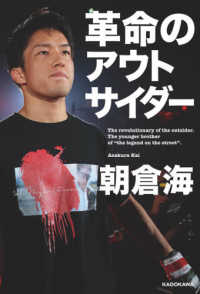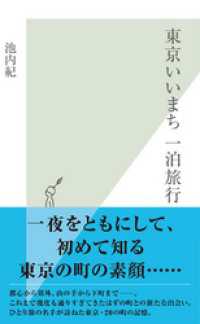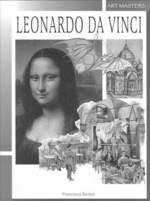- ホーム
- > 洋書
- > 英文書
- > Business / Economics
Full Description
Finding the News tells Peter Copeland's fast-paced story of becoming a distinguished journalist. Starting in Chicago as a night police reporter, Copeland went on to work as a war correspondent in Latin America, the Middle East, and Africa before covering national politics in Washington, DC, where he rose to be bureau chief of the E. W. Scripps Company. The lessons he learned about accuracy and fairness during his long career are especially relevant today, given widespread concerns about the performance of the media, potential bias, and the proliferation of so-called ""fake news."" He offers an honest and revealing narrative, told with surprising humor, about how he learned the craft of news reporting.
Copeland's story begins in 1980, when a colleague hastily declared him a full-fledged reporter after barely four days of training. He went on to learn the business the old-fashioned way: by chasing the news in thirty countries and across five continents. As a young person entering journalism and reporting during some of recent history's most fraught military situations, including Operation Desert Storm and the US invasions of Panama and Somalia, Copeland discovered the craft was his calling. Looking back on his career, Copeland asserts his most important lessons were not about reporting, writing, or the latest technologies, but about the core values that underlie quality journalism: accuracy, fairness, and speed.
Replete with behind-the-scenes stories about learning the trade, Copeland's inspiring account builds into a heartfelt defense of journalism ""done the right way"" and serves as a call to action for today's reporters. The values he learned as a cub reporter are needed now more than ever, he argues, as the integrity and motives of even seasoned journalists are called into question by political partisans. Copeland admits that those critics are not entirely wrong but contends that exciting new technologies, combined with a return to old-school news values, could usher in a golden age of journalism.
-

- 和書
- 革命のアウトサイダー
-

- 電子書籍
- 東京いいまち一泊旅行






